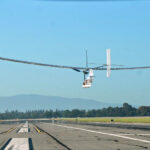Vistara will cease operating under its current name on November 11, marking the completion and merger of the joint venture between Tata Sons, Singapore Airlines and Tata Sons.
The Tata Group owns two major airlines in India. This consolidation will make the newly formed entity a formidable competitor, both nationally and internationally.
The Indian government approved Singapore Airlines’ Rs 2,059 Crore Foreign Direct Investment (FDI) into the expanded Air India Group. This paved the way for the merger.
Singapore Airlines is expected to complete this deal by the end this year.
This merger will result in one of the largest airline groups in the world, streamlining its operations, creating synergies and increasing the group’s competitiveness on a worldwide scale.
Vistara CEO Vinod Kannan stated that the merger was to offer passengers a greater choice, a wider fleet and network as well as elevating the travel experience.
Campbell Wilson, Air India’s CEO and MD, said:
The cross-functional teams of Air India and Vistara worked together for months to ensure that the transition from the old Air India, with its flying crews, ground-based employees, and most importantly our valued customers into the new Air India was as smooth as possible.
ICD examines the impact of the merger on customers, employees and the competition in Indian skies
Why is there a merger?
Vistara is a joint venture of Tata Sons, Singapore Airlines and Tata Sons. It has become a full-service premium airline known for its quality and service.
Air India has also faced financial difficulties, despite its large network and heritage status.
The merger will combine Vistara’s service excellence and Air India’s scale and reach. It will create operational efficiencies and reduce route duplication while optimizing the combined aircraft.
Source: Business Standard
The Tata Group will be able to reduce costs and utilize Air India’s bilateral rights and international slots through this strategic move.
The combined entity will become India’s second largest domestic airline and India’s third largest international airline, increasing its ability to compete against airlines such as IndiGo and global carriers on the long-haul market.
What will happen to flyers?
All flights operated by Vistara until 11 November will continue as normal.
Air India will operate the flights from November 12.
Air India will issue new electronic tickets for existing Vistara flights during this period.
The transition will take place in September and each customer will be informed individually.
Bookings for flights beyond November 11, which are not available through Vistara, must be made via Air India.
Vistara’s website still allows you to book flights for travel on or before 11 November.
Initial changes to product and service offerings will be minimal.
The aircraft and crew of Vistara will remain largely intact until the early part of 2025, even though the flights will be operated under the Air India name.
As the integration process progresses, Air India will continue to modernize its fleet and add a premium economy class, further aligning the offering with Vistara standards.
600 employees will be affected
A Business Standard report states that around 500-600 employees who are not fliers out of a combined workforce of 18000 may be facing retirement or separation due to the merger.
The Tata Group is committed to minimizing the impact of these employees by directing its efforts toward securing job opportunities within Air India as well as other Tata Group Companies.
The merger is not expected to result in job losses for pilots and cabin crew.
The impact of a merger on the competition in India’s aviation sector
The Competition Commission of India observed that the merger may increase market concentration. This could lead to a duopoly on certain routes, both domestic and international. It also might result in a “near-monopoly” for some routes between India & Singapore.
The combined entity could potentially increase prices on these routes.
Source: Business Today
The CCI stated that despite IndiGo’s existence, they are the only two airlines offering business class service on domestic routes. This could lead to a monopoly.
The CCI has approved the merger subject to the voluntary commitments made by the parties.
This article Air India-Vistara merge: what’s next for combined airline giant? This post may be updated as new information becomes available
This site is for entertainment only. Click here to read more






